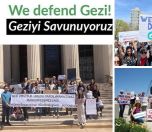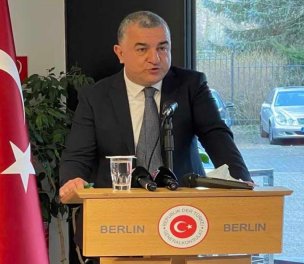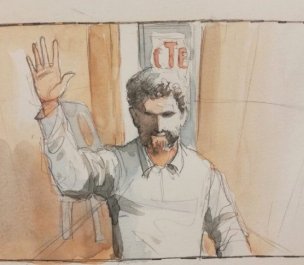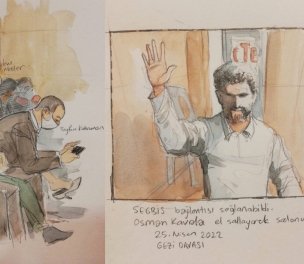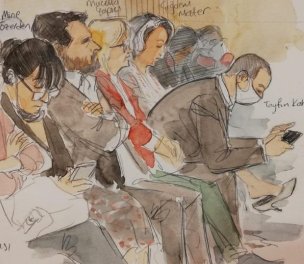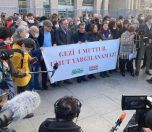Rights defenders in front of the İstanbul Courthouse carrying a banner that reads "Gezi is hope, hope cannot be put on trial."
Click to read the article in Turkish
Yesterday's (April 25) court ruling in the case concerning the countrywide Gezi Park protests in 2013 drew criticism from European Union (EU) officials, the European Parliament and Germany.
Accused of having organized and financed the protests, Osman Kavala, a rights defender and a businessperson, was given an aggravated life sentence for "attempting to overthrow the government." Seven other defendants were sentenced to 18 years in prison for "aiding" this crime.
"Little to none EU perspective for this Turkey"
Nacho Sánchez Amor, the Turkey rapporteur of the European Parliament, and Sergey Lagodinsky, the head of the EU-Turkey Parliamentary Delegation, released a joint statement.
"Turkey's judiciary has confirmed the worst of forecasts when convicting today Osman Kavala to aggravated life sentence on the account of allegedly attempting to overthrow the government.
"This regrettable decision by the İstanbul 13th Heavy Penal Court is in clear contempt to the rulings of the European Court on Human Rights and will surely bring about consequences in the infringement proceedings ongoing at the Council of Europe.
"We express our full solidarity with Osman Kavala and the rest of the defendants in this 'Gezi' trial -who also received heavy jail sentences- and with their families.
"Today is a very sad day not only for them but also for those who daily defend fundamental rights and the rule of law in Turkey and for all those who wish to see the country coming closer to the EU. This is obviously not the way to do it.
"This decision reconfirms the authoritarian character of the current system and it clearly shows the lack of willingness to make any kind of real reforms in the field of fundamental rights and rule of law. In this view, there is little to none EU perspective for the current Turkey, which is sliding away from international consensus on a rule-based order while disrespecting its own international commitments.
"The fact that one of the judges members of the tribunal was a candidate to the National Assembly for the ruling party is just another shocking example of how this case has been marred by political interference. The whole process for the last 4'5 years has been a succession of judicial maneuvers in utter disregard of fair trial standards."
Borrell: ECtHR decision was ignored
Josep Borrell, the vice president of the European Commission and the high representative of the EU for foreign affairs, denounced the judgment in a Twitter post.
"The Turkish Court's life sentence for Osman Kavala together with heavy prison sentences for other defendants show maximum harshness," he wrote.
"They ignore the decision of the European Court for Human Rights.
"Respecting fundamental rights and freedoms is today more important than ever."
Kati Piri, the former Turkey rapporteur of the European Parliament, wrote, "No words to describe my anger and sadness over great injustice done by Erdogan and his courts.
"Osman Kavala given aggravated life sentence & six others given 18 years jail.
Time for EU countries to take action and kick out Turkey from Council of Europe."
Germany: Kavala must be released
Germany's Foreign Minister Annalena Baerbock also released a written statement, saying that the judgment was a "blatant contradiction" to the standards of the rule of law and Turkey's international obligations, to which it is committed as a member of the Council of Europe and an EU member candidate.
The minister called for the immediate release of Kavala.
In a Twitter post, Germany's Culture Minister Claudia Roth described the judgment as "politically motivated" and baseless. Kavala is innocent and should be released immediately, she said.
About Gezi trialThe Gezi trial began again on May 21, 2021 as the court of appeals overturned the verdicts of acquittal given by the local court. Arrested for over 1,200 days, businessperson and rights defender Osman Kavala and 15 other defendants appeared before the judge at the İstanbul 30th Heavy Penal Court in Çağlayan on charge of "attempting to overthrow the government." Here is a brief overview of the judicial process: Who stood trial?Osman Kavala, Mücella Yapıcı, Can Atalay, Tayfun Kahraman, Ali Hakan Altınay, Yiğit Aksakoğlu, Yiğit Ali Ekmekçi, Çiğdem Mater Utku and Mine Özerden, who were acquitted in the first trial; and Can Dündar, Mehmet Ali Alabora, Ayşe Pınar Alabora, Gökçe Tüylüoğlu, Handan Meltem Arıkan, Hanzade Hikmet Germiyanoğlu and İnanç Ekmekçi, whose files were separated, but have been merged again afterwards. Even though he was acquitted in the Gezi trial, Osman Kavala was continued to be kept behind bars in Silivri Prison at the outskirts of İstanbul. Yiğit Aksakoğlu also served 220 days behind bars in the Gezi trial. Who were the aggrieved parties?In the Gezi trial, where rights defenders were acquitted, the members of the 61st term cabinet, which was established in 2011, were referred to as the complainant aggrieved parties in the indictment. On the list of the aggrieved parties were the then PM Recep Tayyip Erdoğan, the then Deputy Prime Ministers Bülent Arınç, Ali Babacan, Beşir Atalay, Bekir Bozdağ, Emrullah İşler and the then Ministers Binali Yıldırım, Fatma Şahin, Egemen Bağış, Nihat Ergün, Faruk Çelik, Erdoğan Bayraktar, Ahmet Davutoğlu, Taner Yıldız, Suat Kılıç, Mehdi Eker, Hayati Yazıcı, Muammer Güler, Cevdet Yılmaz, Ömer Çelik, Mehmet Şimşek, Nabi Avcı, İsmet Yılmaz, Veysel Eroğlu, Mehmet Müezzinoğlu, Zafer Çağlayan and Sadullah Ergin. After founding the Future Party, Ahmet Davutoğlu announced that he withdrew from the files of criminal cases related to the crimes committed against him personally and were not of public nature, especially from the trials for insult, as an aggrieved party. DEVA Party Chair Ali Babacan also said, "I am not a complainant in the Gezi trial, nor am I an intervening party. Thinking that they were aggrieved, the prosecutor wrote the names of all members of the then government one by one. In our judicial system, there is no such thing as withdrawing from the position of an aggrieved party." What were the defendants charged with?In the first 657-page indictment, Gezi was defined as "an insurrection for coup". The defendants were accused of "organizing and funding the protests." They were charged with "attempting to overthrow the government", "damaging property", "damaging places of worship and cemeteries", "violating the Law on Firearms, Knives and Other Tools", "aggravated plunder" and "violating the Law on Protecting Cultural and Natural Assets." In reversing the acquittals, the court of appeals also demanded that a criminal complaint be filed against the defendants on the grounds that they violated the Law no. 2911 on the Meetings and Demonstrations. According to the indictment, 16 defendants separately faced 606 years to 2,970 years in prison. The first trialIn July 2013, 26 people, including Mücella Yapıcı from the Chamber of Architects and Ali Çerkezoğlu from the İstanbul Medical Chamber, were detained. While they were released following their statements, the rights defenders faced a lawsuit for "founding and leading an organization" in March 2014. All defendants were acquitted in the ensuing trial heard by the İstanbul 33th Penal Court of First Instance on April 29, 2015. Afterwards, it was understood that prosecutor Muammer Akkaş was carrying out an investigation against the people who are currently on trial. Akkaş was also the person who gave the instruction to wiretap the rights defenders' phones. However, he was dismissed as part of an investigation into the December 17-25, 2014 operations and fled Turkey. İstanbul Public Prosecutor Yakup Ali Kahveci took over the file after Akkaş. The investigation, which also consisted of the evidence collected by Akkaş, was completed in 2019; the first hearing was held on June 24. Arrested pending trial, Yiğit Aksakoğlu was released at this hearing. A fews days after the second hearing, the Board of Judges and Prosecutors (HSK) changed the court board hearing the case. Accordingly, Galip Mert Perk was assigned as the Presiding Judge and Talip Ergen as a member of the court board. While the HSK did not change the place of duty of senior member Ahmet Tarık Çiftçioğlu, who had ruled in favor of the "continued arrest" of both Osman Kavala and Yiğit Aksakoğlu, the member of the court board who had expressed a dissenting opinion to the related ruling was assigned to another court. Examining the individual application of Osman Kavala, the European Court of Human Rights (ECtHR) pronounced its ruling of right violation on December 10, 2019 and ruled that Osman Kavala should be released immediately. At the final hearing on February 18, 2020, all defendants, except for the ones who were abroad, were acquitted of the offenses charged. Despite this acquittal and the ECtHR judgement, Osman Kavala was arrested again on another charge. Why they stood trial again?Following the acquittals in the Gezi trial, President and Justice and Development Party (AKP) Chair Recep Tayyip Erdoğan spoke at the group meeting of his party. Targeting Kavala, he said, "The person who stirred up Gezi was behind bars. They tried to acquit him with a maneuver." Shortly after this statement was made, the Board of Judges and Prosecutors (HSK) launched an inquiry against the three judges who were the members of the board of the İstanbul 30th Heavy Penal Court. The prosecutor's office also appealed against the verdicts of acquittal. Public Prosecutor Edip Şahiner demanded that the acquittals be reversed. The 3rd Penal Chamber of the İstanbul Regional Court of Justice, the court of appeals, reversed the rulings of acquittal handed down by the local court, the İstanbul 30th Heavy Penal Court, on January 22, 2021. Referring to the charges brought against the defendants in the indictment, the court justified its reversal by indicating that the pieces of evidence such as the defendants' social media posts, press statements and slogans chanted were not considered in handing down the ruling. The second trialThe final hearing of the second trial took place in two sessions on April 23 and April 25, 2022. Osman Kavala, a businessperson and a rights advocate who has been kept in in prison for four and a half years despite an ECtHR verdict, was sentenced to aggravated life imprisonment for "attempting to overthrow the government" while he was acquitted of "espionage." Mücella Yapıcı, Çiğdem Mater, Hakan Altınay, Mine Özerden, Can Atalay, Tayfun Kahraman and Yiğit Ali Ekmekçi were sentenced to 18 years in prison for assisting this crime. |
(SD/VK)




.jpg)
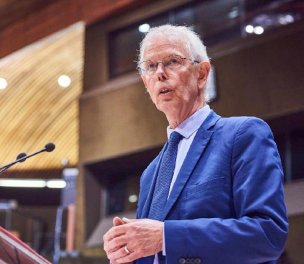
sa.jpg)


